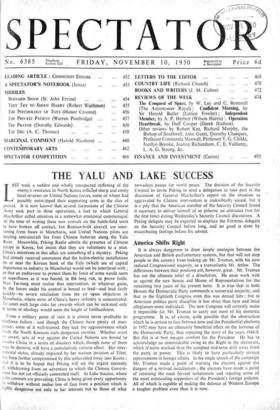THE YALU AND LAKE SUCCESS
I AST week a sudden and wholly unexpected stiffening of the Jen6ny's resistance in North Korea inflicted sharp and costly local reverses on United Nations forces, some of whom had possibly outstripped their supporting arms in the élan of pursuit. It is now known that several formations of the Chinese Army took part in these operations, a fact to which. General MacArthur called attention in a somewhat emotional communiqué. At the time of writing these new arrivals on the battle-field seem to have broken off contact, but Russian-built' aircraft are inter- vening from bases in Manchuria, and United Nations pilots are meeting anti-aircraft fire from Chinese batteries along the Yalu River. Meanwhile, Peking Radio admits the presence of Chinese troops in Korea, but insists that they are volunteers to a man. China's intentions in this affair are something of a mystery. Peking had already received assurances that the hydro-electric installations on or near the Korean bank of the Yalu (which are of capital importance to .industry in Manchuria) would not be interfered with ; so that an endeavour to protect them by force of arms would seem as superfluous as it was bound, in the long run, to prove futile. Mao Tse-tung must realise that intervention, in whatever guise, by the forces under his control is bound to lead—and lead fairly quickly—to severe retaliation from the air upon objectives in Manchuria, where most of China's heavy industry is concentrated. To court such large risks for tewards which can be reckoned only in terms of ideology would seem the height of foolhardiness.
From a military point of view it is almost never profitable to reinforce failure ; and though the Chinese have plenty of man- power, some of it well-trained, they lack the aggressiveness which made the North Koreans such dangerous enemies. Whether overt or covert, acts of war against the United Nations are bound to involve China in a series of disasters which, though none of them may be decisive, will have a cumulatively ruinous effect. Her inter- national status, already impaired by her wanton invasion of Tibet, has been further compromised by this unheralded foray into Korea ; and it is to be hoped that Peking will see the urgent necessity of withdrawing from an adventure to which the Chinese Govern- ment has not yet officially committed itself. At Lake Success, where calm counsels are prevailing, China is being given every opportunity to withdraw without undue loss of face from a position which is highly dangerous not only to her interests but to those of what _ . nowadays passes for world peace. The decision of the Security Council to invite Peking to send a delegation to take part in the discussion of General MacArthur's report on the situation as aggravated by Chinese intervention is undoubtedly. sound, but it is a pity that the American member of the Security Council found it necessary to deliver himself of so polemic an utterance (not for the first time) during Wednesday's Security Council discussions. A Peking delegate may be expected to displace the Formosa delegate on the Security Council before long, and no good is done by exacerbating feelings before his advent.


















































